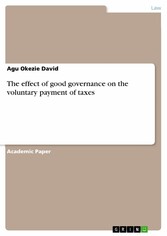Suchen und Finden
The effect of good governance on the voluntary payment of taxes
Academic Paper from the year 2018 in the subject Law - Tax / Fiscal Law, grade: 3.5, University of Nigeria, language: English, abstract: In Nigeria, the need to improve voluntary payment of taxes or voluntary tax compliance has resulted in the various tax reform attempts by various successive governments. Suffice to mention that these reforms have not been able to stimulate the expected increase in tax revenue over the years, and this has snowballed into an unarguable tax gap as revealed in the share of income taxes in total revenue profile of the country. This poor tax compliance behavior often referred to in the literature as the 'compliance puzzle' is a challenging experience across countries but suspected to be more critical in developing economies. In modeling tax compliance, the answer under the traditional theory of compliance is fear of detection and punishment. However, this model has been found to be inadequate in explaining the motives and intentions for tax compliance. The argument is that tax compliance may be subdivided into compliance resulting from enforcements or influence of tax authorities and voluntary compliance. This leads to a logical question which interestingly extends the compliance issue; what would lead citizens to behave more honestly, provide correct information and improve the tax compliance rate voluntarily? One answer to this question is the existence of an intrinsic motivation to pay taxes, which have been sometimes called, 'tax morale'. Tax morale has evolved as an instrumental component in understanding voluntary tax compliance using a more integrated approach with a bias for non-economic factors. This study argues that the citizens' perception of government accountability is an instrumental factor that shapes the emergence and maintenance of tax morale resulting in voluntary tax compliance. The underlining framework is that there is a social contract that defines the relationship between the government and the governed.
Alle Preise verstehen sich inklusive der gesetzlichen MwSt.







